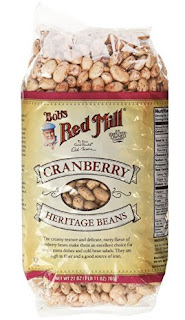Heirloom Beans
 What is Heirloom?
What is Heirloom?Calling a plant heirloom just means that it has not been used on a massive scale for food production, but has been passed down over time from farmers and families on a much smaller scale. Many of these plants are uniquely different from the traditional foods we see on the grocery store shelves.
GMOs (Genetically Modified Organisms)
Even typing this title brings me a little anxiety considering the controversy around this topic. In recent years, I have heard many people expressing their concern around companies like Monsanto, creating and selling genetically modified (GMO) seeds, primarily of the corn, wheat, and soy variety. They claim to be solving the world's hunger crisis by making these GMO crops easier to grow and more resistant to pests and drought. Along with selling these specialized seeds to farmers in developing countries, they also sell the wonder weed killer, Round Up, which they tout as the miracle for keeping crops healthy all year round.
Whereas many non-GMO seeds are perennials, meaning they will continue to reproduce each year, some GMO seeds are modified to function as an annual, meaning new seeds need to be purchased and planted each year along with more Round Up to keep the crop growing. Can you see the vicious cycle here? More and more farmers in developing countries are forced to buy these seeds as in the immediate, they are significantly cheaper and easier to grow than other seeds. This may seem like a viable solution, but the overwhelming cost to farmers, not to mention the harmful chemicals leaching into the ground and water are causing massive problems throughout the global food chain.
What many don't realize is that as we grow, buy, and consume these GMO seeds, we in turn unknowing cause the endangerment and extinction of many different varieties of seeds.
What can we do?
One small way that we can make a difference is to purchase, grow, and eat heirloom varieties of seeds. In general, they have a distinctly richer flavor profile than generic store bought seeds. Along with this, we create a sustainable economy for seeds that otherwise could disappear from the earth forever. A bonus is that typically beans are a less expensive food group and provide many essential nutrients and minerals.
Recently, I came across a bag of Bob's Red Mill Heirloom Cranberry Beans at my local grocery store. One of the features I love about these beans is the red flecks throughout the seed coat. Unfortunately when cooked this beautiful red goes away, but the flavor is rich and deep.
On the back of the package was a recipe for pasta fagioli, a hearty wintertime (or anytime) soup. Since buying local can be a challenge in these winter months, this soup is great way to maintain the local essence by using dried herbs and root vegetables. Normally pasta fagioli is made with pasta, but since I'm avoiding carbs right now, I omitted it, but the beans added just the right texture to make this soup hearty and filling.
Pasta Fagioli recipe from Bob's Red Mill Cranberry Bean Package
2 tbsp olive oil
1 cup chopped onion
3 oz. pancetta, chopped
2 tsp minced garlic
4 sprigs fresh thyme (I used dried, just 2 sprigs instead)
1 sprig fresh rosemary (also used dried)
1 bay leaf
1/4 tsp red pepper flakes
1 cup cranberry beans, sorted and rinsed
8 cups chicken broth
1 tsp salt
1 cup dry macaroni noodles
In a large soup pot, heat oil over medium heat. Add onion, pancetta, and garlic and saute until onion is soft, about 5 minutes. Add herbs and red pepper flakes, beans and chicken broth. Cover and bring to a boil. Reduce heat to medium-low and simmer until beans are soft, about 1 hour. Add macaroni and bring to a boil. Cook until macaroni is tender, about 10 minutes. Remove from heat and stir in salt. Garnish with parmesan cheese. Makes 8 servings.
Resources to purchase heirloom seeds


Comments
Post a Comment